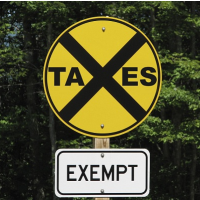Hiding Political Donors Is Key Reason IRS Applicants Sought Tax-Exempt Status

Conservative groups that have accused the Internal Revenue Service (IRS) of unfairly targeting them for review were seeking tax-exempt status—which allows those with this designation to keep secret the names of their contributors.
Following the controversy that has embroiled the IRS and the Obama administration, The New York Times (NYT) examined more than a dozen conservative organizations, most of which operate as 501(c)(4) “social welfare” groups or as 501(c)(3) charities.
The newspaper concluded that these groups conducted myriad election activities that tax experts and former IRS officials said would be enough reason to scrutinize their applications.
“Money is not the only thing that matters,” Donald B. Tobin, a former lawyer with the Justice Department’s tax division who is a law professor at Ohio State University, told the NYT. “If you have a thousand volunteer hours and only spend a dollar, but those volunteers are to help a particular candidate, that’s a problem.”
That is because, to qualify for the tax exemption, participation in elections cannot be a group’s primary activity, with circumstances and facts regarding its work carrying at least as much weight as the amount of money that is spent. This can include the group’s website, the material it publishes, and whether its members are employed by political parties.
One group that qualified for a 501(c)(4) in 2006—Emerge America—had its status revoked by the IRS six years later because it was discovered that its work, training women to run for public office, focused only on Democratic females and was therefore in business to benefit a single political party. Its current website does not hide its partisan affiliation.
Groups that achieve tax-exempt status from the IRS are not required to disclose the names of their financial donors, which helps to shield their political standing and activities. In criticizing the IRS Cincinnati office’s work, Treasury Department inspector general (I.G.) J. Russell George—in his report (pdf) issued this month—stated that it was inappropriate to question groups about their donors or plans to run for public office. However, a number of former IRS officials disagreed, saying that such queries are allowed if relevant to the application.
“Half of those questions have been found to be germane in court decisions,” Marcus S. Owens, former chief of the IRS’s Tax Exempt & Government Entities Division, told the NYT. “The I.G. was as careless with terminology as the Cincinnati office was.”
“While some of the I.R.S. questions may have been overbroad,” added Tobin, “you can look at some of these groups and understand why these questions were being asked.”
For instance, there is CVFC, a conservative veterans’ group in California, which applied for tax-exempt status, while spending nearly $8,000 on radio ads backing a Republican candidate for Congress. The group had told the IRS that it did not engage in political activities.
Another group, the Wetumpka Tea Party from Alabama, sponsored training for a get-out-the-vote initiative dedicated to the “defeat of President Barack Obama” while the IRS considered its application.
Yet another tea party outfit, the Ohio Liberty Coalition, complained about the scrutiny it was getting from the IRS, in spite of the fact that it engaged in a pro-Romney email campaign and organized statewide anti-Obama protests that “demand[ed] the truth about Benghazi.” The group’s president claimed that his lawyers had told him “it’s not political activity.”
These advocacy groups played important roles in the last two elections (2010 midterms and 2012 presidential), and will likely do the same again in 2014. That’s why some observers believe the controversy arose now, in order to get the IRS off their backs before next year.
“Some election lawyers said they believed a wave of lawsuits against the I.R.S. and intensifying congressional criticism of its handling of applications were intended in part to derail those audits, giving political nonprofit organizations a freer hand during the 2014 campaign,” Nicholas Confessore and Michael Luo wrote at the NYT.
-Danny Biederman, Noel Brinkerhoff
To Learn More:
Groups Targeted by I.R.S. Tested Rules on Politics (by Nicholas Confessore and Michael Luo, New York Times)
And You Thought the IRS Was Bad? The World's Five Most Out-of-Control Tax Agencies (by J. Dana Stuster, Foreign Policy)
NorCal Tea Party Leads Charge against IRS that May Put Focus on Dubious Nonprofit Claims (by Ken Broder, AllGov California)
Why Did IRS Ignore Karl Rove’s Tax-Exempt Organizations while Targeting Small Conservative Groups? (by Noel Brinkerhoff and Danny Biederman, AllGov)
IRS Balks at Investigating Tax-Exempt Organizations Accused of Violating Tax Laws (by Noel Brinkerhoff, AllGov)
IRS Clashes with Conservative Campaign Groups Claiming Non-Profit Status (by David Wallechinsky, AllGov)
- Top Stories
- Unusual News
- Where is the Money Going?
- Controversies
- U.S. and the World
- Appointments and Resignations
- Latest News
- Trump to Stop Deportations If…
- Trump Denounces World Series
- What If China Invaded the United States?
- Donald Trump Has a Mental Health Problem and It Has a Name
- Trump Goes on Renaming Frenzy






Comments